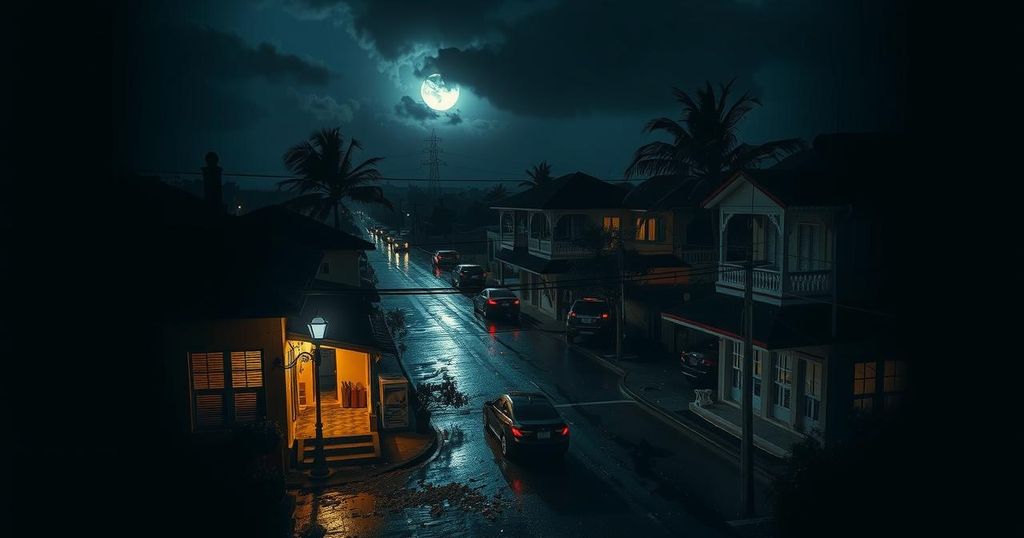Cuba Faces Ongoing Blackouts Amid Hurricane Oscar Threat

Millions of Cubans are without electricity for the third day due to repeated failures in the aging energy grid, coinciding with the arrival of Hurricane Oscar. Restoration efforts have been disrupted by the hurricane, which is expected to impact eastern Cuba soon. The situation has led to public unrest and challenges in daily life, worsened by U.S. sanctions and an inadequate infrastructure.
As the nation approaches a challenging crisis, millions of Cubans remain without electricity for the third consecutive day following inadequate restoration efforts that failed overnight. The Cuban Electrical Union reported that approximately 16% of the population had their power restored; however, the aging energy grid experienced another failure late Saturday. This situation signals the third total collapse of Cuba’s energy infrastructure since Friday, leaving the bulk of the 10 million residents without consistent power. The power restoration efforts are further complicated by the imminent arrival of Hurricane Oscar on eastern Cuba, which meteorologists anticipate will bring severe winds and swells. According to the National Hurricane Center’s 5 a.m. EDT report, Hurricane Oscar has already made landfall on Inagua Island in The Bahamas with wind speeds reaching 80 mph. It is projected to strike the northeastern coast of Cuba later today. Although weakening is expected post-landfall, the storm could persist as a tropical storm while moving north of Cuba late Monday and traversing the central Bahamas on Tuesday. The first nation-wide blackout in Cuba occurred on Friday due to a significant failure at one of the country’s primary power plants. Shortly after officials announced gradual restoration of service, a second blackout emerged early Saturday morning. These consecutive failures threaten to deepen the crisis within the country, where reliable electricity is crucial for water supply and food preservation. In the capital city of Havana, residents have taken to social media platforms such as WhatsApp to share information regarding power availability in various neighborhoods, while others have coordinated the storage of necessary medications with those fortunate enough to temporarily have power. In the meantime, citizens endured lengthy queues for bread, with tensions rising as supplies dwindled at the few operational vendors. Concerns are being raised about the absence of traditional Cuban allies such as Venezuela, Russia, and Mexico, who have historically provided the island with critical oil supplies. Tourists still navigate Havana’s streets in vintage 1950s automobiles; however, many hotel generators have run out of fuel. A foreign traveler noted that operations at José Martí International Airport were severely limited, relying solely on emergency power, which impeded the issuance of tickets and air conditioning. Reports have emerged of small protests in the capital, reflecting the public’s discontent with the ongoing crisis. Cuban officials attribute the energy failure to multiple factors, including heightened U.S. economic sanctions, disturbances caused by recent hurricanes, and the deteriorating state of Cuba’s infrastructure. In a troubled televised address, Prime Minister Manuel Marrero Cruz acknowledged that much of the economy had been halted to prioritize power generation for citizens, remarking, “We have been paralyzing economic activity to generate (power) to the population.” Furthermore, José Angel Portal Miranda, the Minister of Health, confirmed that health facilities are currently powered by generators, allowing medical staff to maintain essential services.
Cuba has historically faced challenges with its energy grid, resulting in frequent power outages that impede daily life and strain the population. The energy crisis has been exacerbated by a myriad of external and internal pressures, including severe weather events such as hurricanes and the impact of U.S. economic sanctions. With an aging infrastructure in desperate need of modernization, the Cuban government struggles to meet the energy demands of its citizens, particularly in times of crisis, which has been highlighted by the consecutive nationwide blackouts and their chaotic aftermath for the populace.
In conclusion, Cuba finds itself amidst a significant energy crisis compounded by the impending threat of Hurricane Oscar. The inability to stabilize the power grid, coupled with public distress and inconvenience during the current blackouts, poses serious challenges to the nation. While authorities attribute this crisis to a combination of external sanctions and infrastructural decay, the immediate repercussions are visible in the everyday lives of citizens, who are left to contend with long lines for food and uncertainty about their health and livelihood during a time of natural disaster.
Original Source: www.cnn.com






